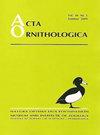Absolute Densities of Breeding Birds in Estonian Forests: A Synthesis
IF 1.3
4区 生物学
Q3 ORNITHOLOGY
引用次数: 0
Abstract
Abstract. This paper synthesizes all available quantitative information on total breeding densities of Estonian forest bird assemblages, as estimated in territory mapping studies since the 1950s. There have been two approaches, one based on multiple visits (typically 7–8), and the other of reduced effort, developed for long-term monitoring. Compared to these mapping methods, line (strip) transects give ca. 30% lower estimates; they also vary widely. After quality checking, a total of 90 mapping estimates were extracted. The estimates were then integrated into ‘typical densities’ by habitat types, after critically assessing data quality and bias. ‘Typical density’ is conceptualized as a range of common density values in actual topographic, soil, forest-age and landscape conditions, under minor recent thinning influence. It also considers 15–20% underestimation of the territory mapping, which was demonstrated using a case study on post-breeding nest searching of three thrush (Turdus spp.) species. The Estonian forest bird densities show monotonous increases along the stand age, following three alternative shapes related to site productivity: a major increase within 100 years in the most productive forests, a delayed increase (also post 100 years) in pine forests of medium productivity, and slow and slight increases at low-productivity sites. Such density estimates can serve as a basis to analyse deviations in particular conditions and be integrated into land-use scenario-modelling tools across landscapes. It is important to keep the territory mapping approaches to bird census in active use and development, since several issues in conservation and ecosystem functioning cannot be addressed by relative assessments.爱沙尼亚森林中繁殖鸟类的绝对密度:一项综合研究
摘要本文综合了自20世纪50年代以来在领土测绘研究中估计的爱沙尼亚森林鸟类群落总繁殖密度的所有可用定量信息。有两种方法,一种是基于多次访问(通常为7-8次),另一种是为长期监测而开发的减少工作量的方法。与这些制图方法相比,线(条)样带的估计值低约30%;它们的差异也很大。在质量检查之后,总共提取了90个映射估计。在严格评估数据质量和偏差后,将估计值按栖息地类型整合到“典型密度”中典型密度”被概念化为在最近的轻微疏伐影响下,在实际地形、土壤、森林年龄和景观条件下的一系列常见密度值。它还考虑了对领土测绘的15%-20%的低估,这是通过对三种画眉鸟(Turdus spp.)繁殖后巢穴搜索的案例研究证明的。爱沙尼亚森林鸟类密度随林分年龄单调增加,呈现出与林分生产力有关的三种不同形态:生产力最高的森林在100年内大幅增加,生产力中等的松林延迟增加(也在100年后),生产力低的地点缓慢而轻微增加。这种密度估计可以作为分析特定条件下偏差的基础,并被纳入整个景观的土地利用情景建模工具中。重要的是要积极利用和发展鸟类普查的领土测绘方法,因为相对评估无法解决保护和生态系统功能方面的几个问题。
本文章由计算机程序翻译,如有差异,请以英文原文为准。
求助全文
约1分钟内获得全文
求助全文
来源期刊

Acta Ornithologica
生物-鸟类学
CiteScore
2.10
自引率
0.00%
发文量
14
审稿时长
>12 weeks
期刊介绍:
Publishes scientific papers (original research reports, reviews, short notes, etc.) and announcements from all fields of ornithology. All manuscripts are peer-reviewed.
Established in 1933 as Acta Ornithologica Musei Zoologici Polonici, since 1953 continued under the present title.
Published twice a year by the Natura Optima Dux Foundation under the auspices of the Museum and Institute of Zoology, Polish Academy of Sciences.
 求助内容:
求助内容: 应助结果提醒方式:
应助结果提醒方式:


